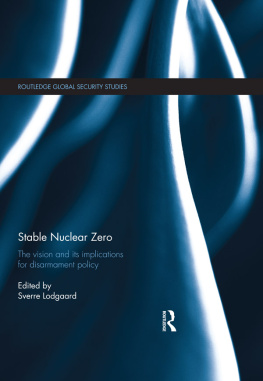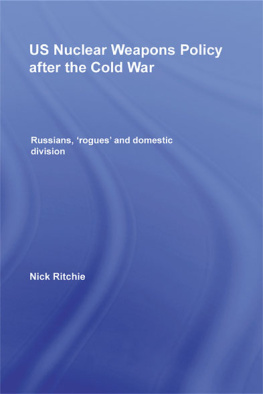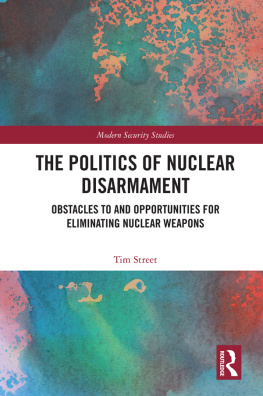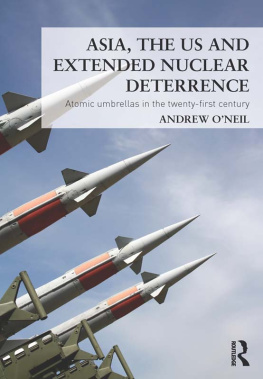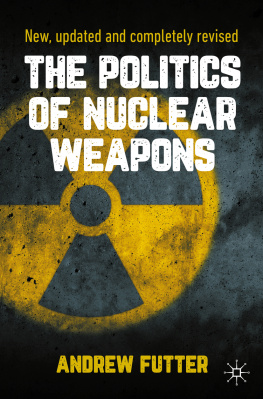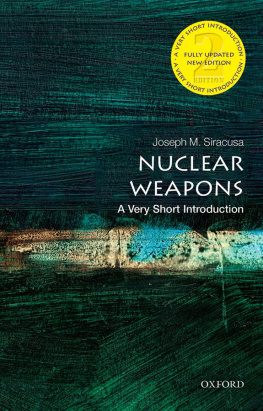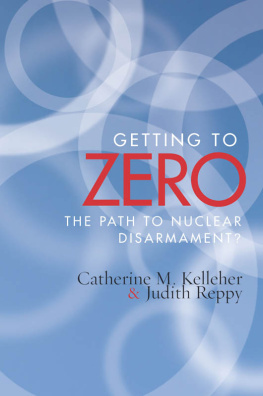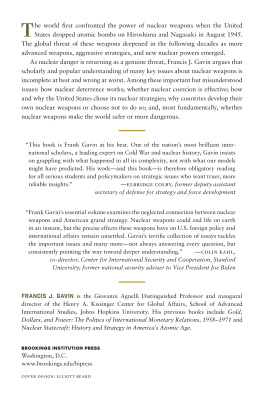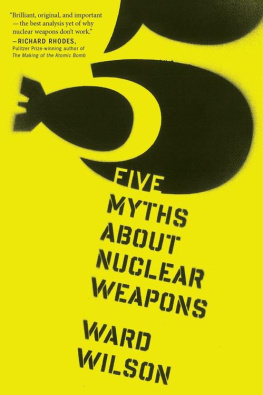
Nuclear Exits
Many countries have the capacity to construct nuclear weapons even relatively poor and small ones, as the North Korean example shows us. So far, only one country South Africa has voluntarily given up its nuclear weapons programme. Three others Ukraine, Kazakhstan and Belarus gave up the Soviet Unions nuclear weapons after the end of the Cold War. A number of others (including Australia, Sweden and Switzerland) have at one time or another made plans to build nuclear weapons, but eventually opted not to do so.
These stories can shed significant light on the prospects for nuclear disarmament one of the biggest global challenges of our time. Yet they have received little scrutiny in the academic literature to date. This volume addresses that gap, bringing together scholars, practitioners and politicians to reflect on the history of nuclear exits (and nuclear non-entries) and to draw out some key lessons for future nuclear disarmament and non-proliferation efforts.
Although progress on reducing nuclear arsenals has been frustratingly slow, there are strong indications that world opinion is increasingly supportive of nuclear exits. Organizations such as International Physicians for the Prevention of Nuclear War, the International Committee of the Red Cross and the World Medical Association have all taken a strong stand against nuclear weapons. Ultimately ridding the world of nuclear weapons requires politicians to take determined action to decide in favour of nuclear exits. The chapters in this volume show that such decisions are possible and that a worldwide nuclear exit is achievable within our lifetimes. This book was published as a special issue of Medicine, Conflict and Survival.
Ilkka Taipale is a social psychiatrist. He was a member of the Finnish Parliament in 197175 and 200007, and of Helsinki City Council 196980 and from 1993 onwards. He has edited books on peace, war and social medicine. Titles include War or Health (2001), and One Hundred Social Innovations from Finland, in English (2007). This work has been published in no less than twenty languages.
Vappu Taipale is a child psychiatrist, former minister of health and social affairs in Finland. She was also a member and chair of the United Nations University Council, co-president of the International Physicians for the Prevention of Nuclear War (IPPNW) 200812. She is Honorary President of the International Society for Gerontechnology and chair of the Union for Senior Services in Finland.
First published 2015
by Routledge
2 Park Square, Milton Park, Abingdon, Oxon, OX14 4RN, UK
and by Routledge
711 Third Avenue, New York, NY 10017, USA
Routledge is an imprint of the Taylor & Francis Group, an informa business
2015 Taylor & Francis
All rights reserved. No part of this book may be reprinted or reproduced or utilised in any form or by any electronic, mechanical, or other means, now known or hereafter invented, including photocopying and recording, or in any information storage or retrieval system, without permission in writing from the publishers.
Trademark notice: Product or corporate names may be trademarks or registered trademarks, and are used only for identification and explanation without intent to infringe.
British Library Cataloguing in Publication Data
A catalogue record for this book is available from the British Library
ISBN13: 978-1-138-89910-0
Typeset in Times New Roman
by Swales & Willis Ltd, Exeter, Devon, UK
Publishers Note
The publisher accepts responsibility for any inconsistencies that may have arisen during the conversion of this book from journal articles to book chapters, namely the possible inclusion of journal terminology.
Disclaimer
Every effort has been made to contact copyright holders for their permission to reprint material in this book. The publishers would be grateful to hear from any copyright holder who is not here acknowledged and will undertake to rectify any errors or omissions in future editions of this book.
Contents
Ilkka Taipale
F.W. de Klerk
Juha Rautjrvi
Jayantha Dhanapala
Sico van der Meer
Maria Rost Rublee
Thomas Jonter and Emma Rosengren
Andreas Nidecker
Tilman A. Ruff
The chapters in this book were originally published in Medicine, Conflict and Survival , volume 30, supplement 1 (August 2014). When citing this material, please use the original page numbering for each article, as follows:
Chapter 1
Nuclear exit in our lifetime
Ilkka Taipale
Medicine, Conflict and Survival , volume 30, supplement 1 (August 2014) pp. s1s2
Chapter 2
The importance of rejecting the Gollums ring of nuclear power: speech to the nuclear exits conference, Helsinki, 18 October 2013
F.W. de Klerk
Medicine, Conflict and Survival , volume 30, supplement 1 (August 2014) pp. s3s9
Chapter 3
Initial inventory negotiations between the IAEA and the Republic of South Africa, 1991: personal reflections on a nuclear exit
Juha Rautjrvi
Medicine, Conflict and Survival , volume 30, supplement 1 (August 2014) pp. s10s17
Chapter 4
The Middle East as a weapons of mass destruction-free zone
Jayantha Dhanapala
Medicine, Conflict and Survival , volume 30, supplement 1 (August 2014) pp. s18s26
Chapter 5
Forgoing the nuclear option: states that could build nuclear weapons but chose not to do so
Sico van der Meer
Medicine, Conflict and Survival , volume 30, supplement 1 (August 2014) pp. s27s34
Chapter 6
Scholarly research on nuclear exits: the role of civil society
Maria Rost Rublee
Medicine, Conflict and Survival , volume 30, supplement 1 (August 2014) pp. s35s45
Chapter 7
From nuclear weapons acquisition to nuclear disarmament the Swedish case Thomas Jonter and Emma Rosengren
Medicine, Conflict and Survival , volume 30, supplement 1 (August 2014) pp. s46s63
Chapter 8
The Swiss nuclear bomb dream
Andreas Nidecker
Medicine, Conflict and Survival , volume 30, supplement 1 (August 2014) pp. s64s70
Chapter 9
Nuclear-enmeshed Australia: an obstacle to nuclear weapons eradication Tilman A. Ruff
Medicine, Conflict and Survival , volume 30, supplement 1 (August 2014) pp. s71s80
Please direct any queries you may have about the citations to
Jayantha Dhanapala is President of the Pugwash Conferences on Science and World Affairs, and a governing board member of the Stockholm International Peace Research Institute. He is former UN Under-Secretary-General and former Ambassador for Sri Lanka to UN.
Thomas Jonter is Professor of International Relations and Director of the Graduate School of International Studies at Stockholm University, Sweden. His research focuses on nuclear non-proliferation and energy security. He is currently completing a book manuscript, Explaining Nuclear Forbearance: Sweden and the Plans to Acquire Nuclear Weapons, 19451968 .
F.W. de Klerk was the President of South Africa from 19891994. He brokered the end of apartheid, helped to negotiate a new non-racial constitutional democracy, dismantled South Africas nuclear weapons and served as deputy President to Nelson Mandela, with whom he won the Nobel Peace Prize in 1993. He is the Chairman Emeritus of the F.W. de Klerk Foundation, which upholds the South African constitution and promotes peaceful coexistence in multi-community countries.


